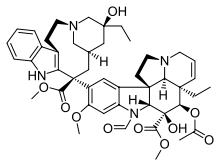Vinca alkaloid

Vinca alkaloids are a set of anti-mitotic and anti-microtubule alkaloid agents originally derived from the periwinkle plant Catharanthus roseus (basionym Vinca rosea) and other vinca plants.
Vinca alkaloids are used in chemotherapy for cancer. They are a class of cell cycle–specific cytotoxic drugs that work by inhibiting the ability of cancer cells to divide: Acting upon tubulin, they prevent it from forming into microtubules, a necessary component for cellular division.[1]
Vinca alkaloids are now produced synthetically and used as drugs in cancer therapy and as immunosuppressive drugs. These compounds include vinblastine, vincristine, vindesine, and vinorelbine.
Additional researched vinca alkaloids include, desoxyvincaminol, vincaminol, vinburnine, vincamajine, vineridine, and vinburnine.
Vinpocetine is a semisynthetic derivative of the vinca alkaloid vincamine (sometimes described as "a synthetic ethyl ester of apovincamine").[2]
References
- ↑ Takimoto, C. H.; Calvo, E. (2008). "Chapter 3: Principles of Oncologic Pharmacotherapy". In Pazdur, R.; Wagman, L. D.; Camphausen, K. A.; Hoskins, W. J. Cancer Management: A Multidisciplinary Approach (11th ed.). ISBN 978-1-891483-62-2.
- ↑ Lörincz C, Szász K, Kisfaludy L (1976). "The synthesis of ethyl apovincaminate". Arzneimittel-Forschung 26 (10a): 1907. PMID 1037211.